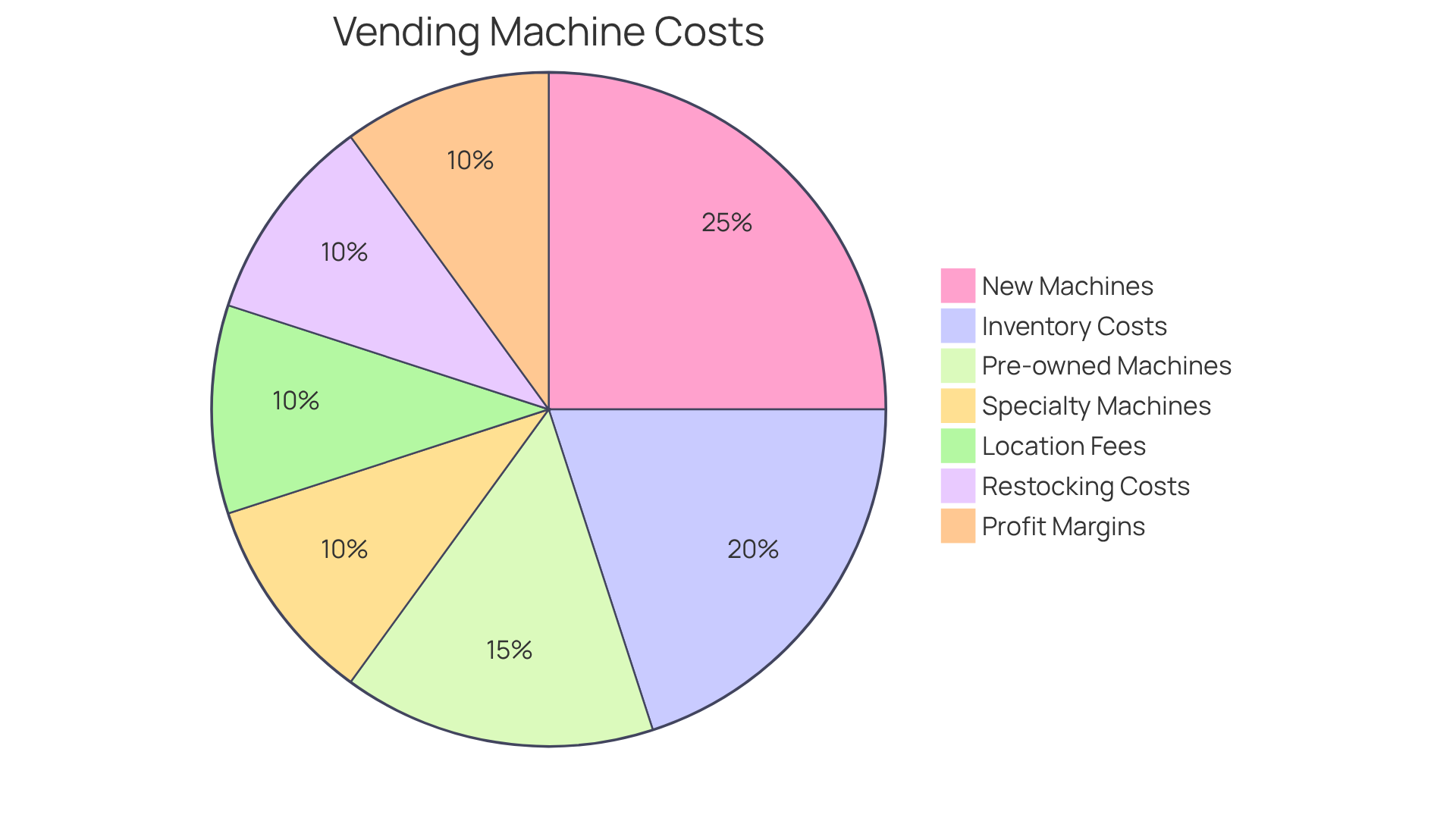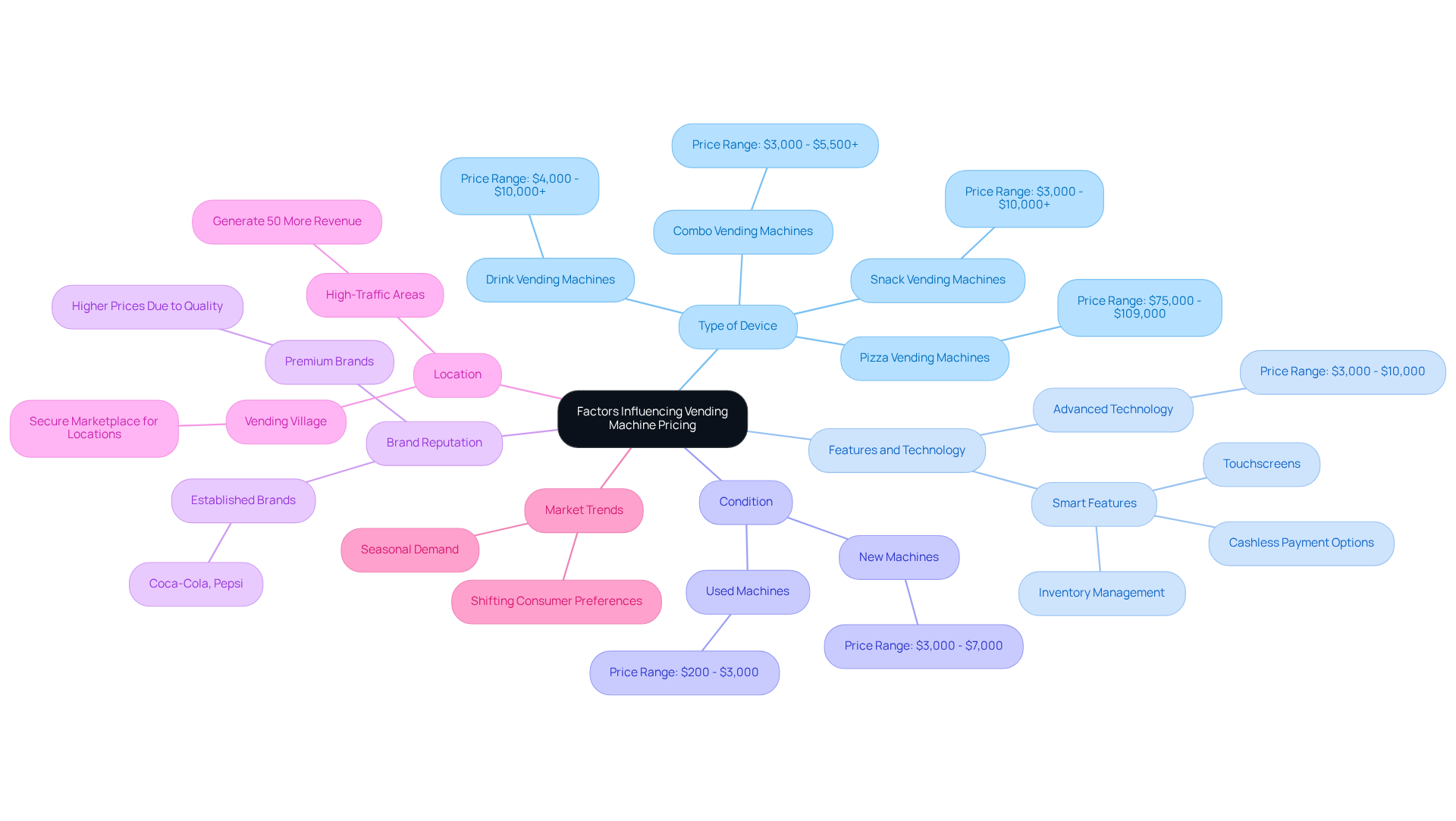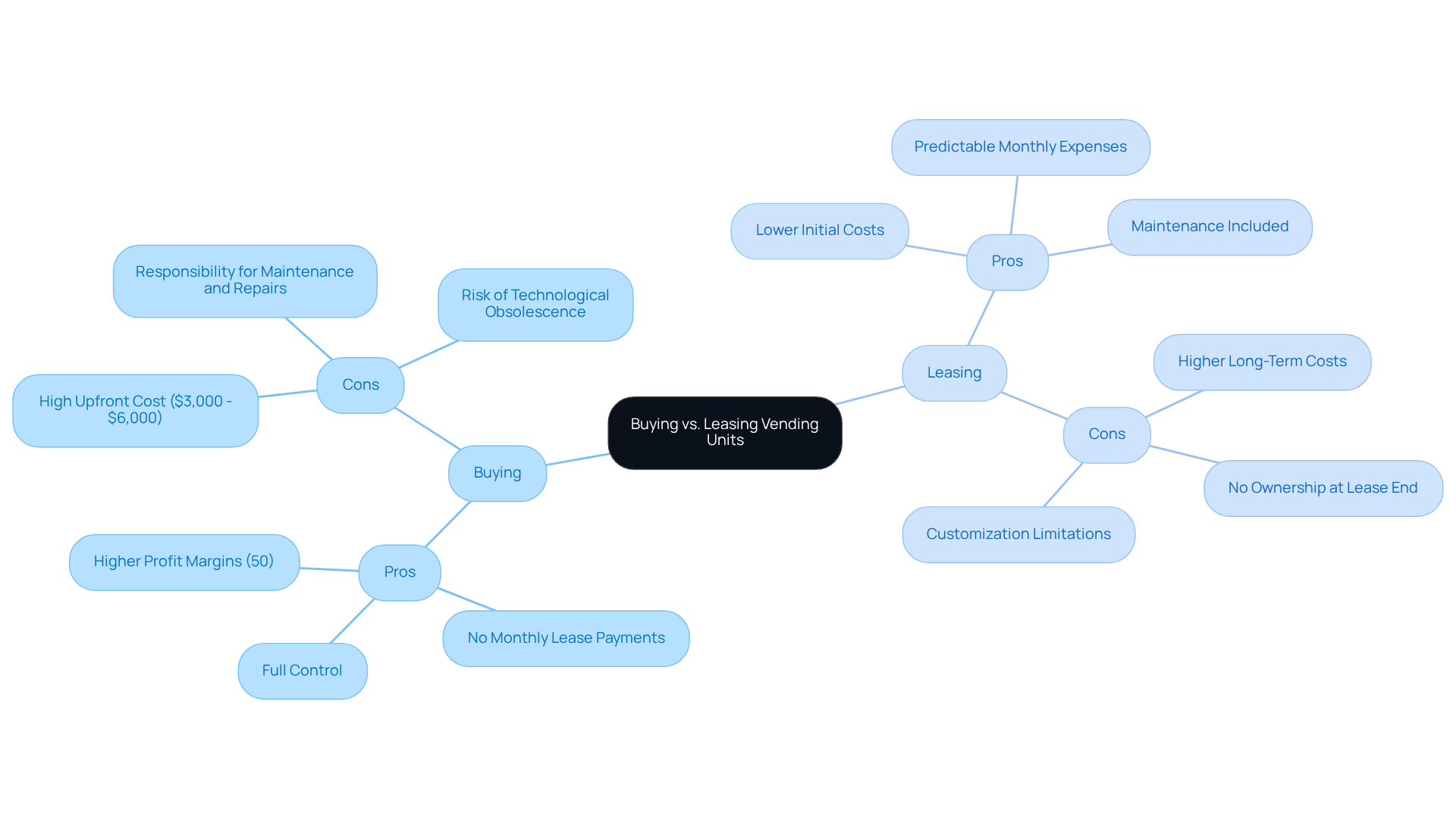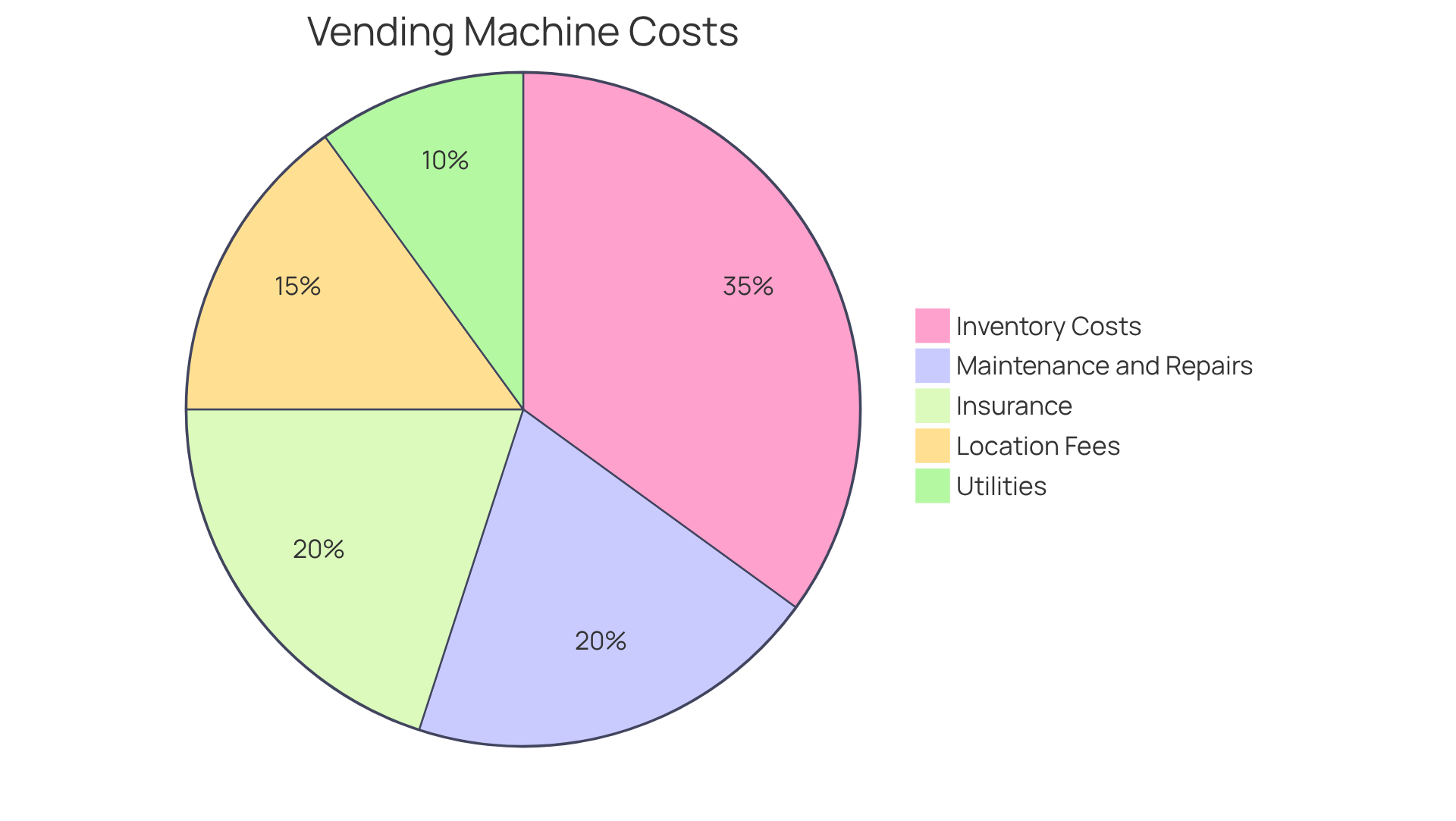Overview
Let’s talk about vending machine costs. You might be surprised to learn that prices can vary quite a bit. You’re looking at around $1,500 for a pre-owned machine, but if you want something specialized, it could easily top $15,000. It really depends on the type, features, and market demand.
Now, here’s the thing: it’s not just about the initial purchase. You’ve got to consider ongoing expenses too. Think about:
- Inventory
- Maintenance
- Location fees
- Utilities
These costs are crucial for keeping your budget in check and making your vending business profitable.
So, if you’re diving into this venture, take the time to understand all these factors. It’ll help you make informed decisions and set yourself up for success.
Introduction
Diving into the world of vending machines? It’s essential to understand the financial landscape first. The costs can vary quite a bit depending on the type of machine, its features, and where you place it. This means that if you're considering this automated retail venture, you'll need to navigate a pricing structure that can really affect your bottom line.
As we look toward 2025, you might be wondering: what strategies can you use to make a solid investment? By exploring the ins and outs of vending machine costs, you’ll uncover the key factors that influence pricing. Plus, you’ll get a clearer picture of the ongoing financial commitments necessary for long-term success in this competitive field.
So, let’s break it down and get you equipped with the knowledge you need!
Explore the Basics of Vending Machine Costs
The costs associated with vending machines can really vary, and it’s important to know why. For starters, the type of machine, its features, and market demand all play a role. As we look ahead to 2025, you can expect to pay anywhere from $3,000 to $10,000 for new dispensers. Pre-owned units? They’re typically priced between $1,500 and $5,000. If you’re eyeing specialty machines, like those for fresh food or beverages, be prepared to spend over $15,000. That’s a reflection of their advanced tech and capabilities. Understanding and their price ranges is essential for budgeting and planning your vending business.
Now, don’t forget about the costs tied to inventory. These can significantly bump up your initial investment, sometimes by hundreds or even thousands of dollars. Location fees also matter; they could be a percentage of sales or a flat monthly rate, which adds another layer to your expenses. For example, machines in high-traffic spots can often recover their full investment in about 18 months. So, choosing the right location is crucial.
Here’s something to consider: the typical cost to restock a snack dispenser is around $150 to $200 each month. Make sure to factor that into your ongoing expenses. On top of that, profit margins for automated dispensers usually range from 20% to 30%, depending on the products you choose and the quality of the location. This financial insight underscores the need for thorough market analysis and careful financial planning as you step into the automated retail world.

Identify Key Factors Influencing Vending Machine Pricing
Let’s talk about what really drives the vending machine costs. It’s not just about slapping a price tag on them; there are several key factors at play here.
- The type of device matters a lot. For example, if you’re looking at snack dispensers, you might find prices ranging from $3,000 to over $10,000. Drink dispensers? They typically fall between $4,000 and $10,000 as well. And if you’re eyeing something specialized, like a pizza vending machine, be prepared to shell out between $75,000 and $109,000.
- Now, let’s dive into features and technology. Machines that come with cool extras—think cashless payment options, touchscreens, and inventory management—usually cost more. Intelligent vending devices can start around $3,000 and go up, reflecting those enhanced capabilities.
- Next up is the condition of the equipment. New machines, packed with the latest tech and reliability, often range from $3,000 to $7,000. But if you’re open to pre-owned options, you might snag something for as little as $200 to $3,000, though you might have to deal with some maintenance issues.
- Then there’s brand reputation. Well-known brands, like Coca-Cola and Pepsi, often charge more because of their . It’s like paying a bit extra for a trusted friend.
- Location plays a big role too. Machines in high-traffic areas—offices, schools, you name it—can rake in up to 50% more revenue than those in quieter spots. That’s why Vending Village is a game changer; they offer a secure marketplace for pre-approved locations, ensuring sellers are verified and transactions are safe. Plus, with secure payment processing through Stripe, you can trust that your transactions are in good hands. And let’s not forget, Vending Village has a solid 4.9/5 rating from reviews—talk about social proof! Investing in a location through them means you’re covered by a 100% money-back guarantee if it doesn’t match the description.
- Finally, keep an eye on market trends. Seasonal demand and shifting consumer preferences can really shake up pricing strategies. Staying in the loop about industry trends is key for making smart adjustments to your offerings.
Understanding these factors is crucial for making informed decisions about vending machine costs when investing in automated retail systems. It’s all about enhancing profitability and sustainability in your business. So, what’s your next move?

Evaluate Buying vs. Leasing: Making Informed Decisions
When you're looking at vending units, you've got to decide whether to buy or lease. Each option comes with its own set of perks and challenges.
Buying
Pros:
- Owning the machine means you have full control. You can customize it and brand it to fit your workplace culture.
- Say goodbye to monthly lease payments! That can really boost your savings over time and improve your bottom line.
- You can pocket more profit since you . Unlike local vendors who take a cut—usually between 10% to 20%—automated dispensers can give you about 50% of the product cost as profit. Sounds good, right?
Cons:
- The upfront cost can be pretty hefty, which might stretch your budget, especially if you’re just starting out. The vending machine costs for basic snack machines range from $3,000 to $4,000, while the vending machine costs for fancier models can go from $5,000 to $6,000.
- You’re also on the hook for maintenance and repairs. That can add up and take time away from your day-to-day operations. Plus, you have to think about keeping up with technology since consumer preferences can change fast.
Leasing
Pros:
- Leasing usually means lower initial costs, making it easier for businesses with tight budgets or those just dipping their toes into vending. This way, you can put your resources into other important areas of your business.
- You’ll know what your monthly expenses are, which makes budgeting a breeze. Consistent costs mean less financial stress.
- Many leasing deals come with maintenance included, so you won’t have to worry about repairs. That keeps your equipment running smoothly without a lot of downtime.
Cons:
- Over time, leasing can actually cost more than buying when you factor in interest and fees, which can add up.
- Plus, you won’t own the equipment at the end of the lease. That means you miss out on long-term financial benefits.
In short, whether you decide to buy or lease snack dispensers really comes down to your financial situation, business goals, and the market you're stepping into. Successful operators like Jeff Cramer emphasize the importance of aligning your sales strategy with your overall business objectives to maximize profits and efficiency. And don’t forget about financing options! For instance, PayPal has a deal with no money down and 0% interest for six months, which can really help ease those initial financial hurdles if you’re leaning towards ownership.

Understand Ongoing Operating Costs and Financial Commitments
Running a vending machine involves several ongoing vending machine costs that can significantly affect your bottom line. Let’s break it down.
Inventory Costs: Keeping your machine stocked is key to making money. Depending on where your machine is and how much it sells, you might spend anywhere from $200 to $500 a month on inventory. In busy spots, it could be even more. Just remember, restocking usually eats up about 30-50% of your sales.
Maintenance and Repairs: You’ll want to set aside about $50 to $100 each month for . Plus, don’t forget to budget for repairs, which can add another $20 to $200 monthly. Maintenance can take up to 15% of your total costs, so staying on top of it can save you from costly breakdowns later.
Location Fees: If you’re placing your machine in a leased location, be prepared to pay location royalties. These usually run from 5% to 10% of your sales, but some can even hit 20%. Knowing these fees is super important for keeping your budget accurate.
Utilities: Your vending machine needs power, and costs can vary based on how much you use it and local rates. Expect to pay between $20 and $100 each month for utilities, depending on your machine’s energy consumption and how long it’s running. Older machines can rack up an extra $10 to $50 in electricity costs.
Insurance: Protecting your investment with insurance is a must. It covers theft, damage, and liability, and while this cost can change, it’s essential for safeguarding against the unexpected.
By getting a handle on these ongoing vending machine costs, you can better manage your finances and keep your vending business thriving.

Conclusion
Getting a grip on the costs tied to vending machines is super important for anyone thinking about diving into the automated retail game. The financial scene is influenced by a bunch of factors, like the type of machine, its features, and what’s hot in the market. You can expect costs to range from around $3,000 to over $15,000 for different machines, plus ongoing expenses like inventory, location fees, and maintenance.
So, what’s the takeaway here? Strategic planning is key when it comes to managing those vending machine costs. Think about it:
- The type of device
- Its tech features
- Brand reputation
- Location
All play a big role in pricing. And then there's the choice between buying and leasing machines, each with its own perks and pitfalls. It’s all about making careful financial choices that align with your business goals.
At the end of the day, really understanding vending machine costs and what impacts them can help you make smart decisions. By keeping an eye on market trends and digging into financial analyses, you can boost your profitability and sustainability in the vending world. Taking the time to assess these factors can set you up for a successful venture in automated retail, opening doors to a profitable business opportunity.
Frequently Asked Questions
What factors influence the costs of vending machines?
The costs of vending machines vary based on the type of machine, its features, and market demand.
What is the price range for new vending machines as of 2025?
New vending machines can be expected to cost between $3,000 and $10,000.
How much do pre-owned vending machines typically cost?
Pre-owned vending machines are generally priced between $1,500 and $5,000.
What is the cost of specialty vending machines?
Specialty machines, such as those for fresh food or beverages, can cost over $15,000 due to their advanced technology and capabilities.
What additional costs should be considered when investing in vending machines?
Additional costs include inventory expenses, location fees, and ongoing restocking costs.
How much does it typically cost to restock a snack vending machine each month?
The typical cost to restock a snack dispenser is around $150 to $200 each month.
How do location fees impact vending machine expenses?
Location fees can be a percentage of sales or a flat monthly rate, adding to the overall expenses of operating a vending machine.
How quickly can machines in high-traffic locations recover their investment?
Machines in high-traffic spots can often recover their full investment in about 18 months.
What are the typical profit margins for automated vending machines?
Profit margins for automated dispensers usually range from 20% to 30%, depending on the products and location quality.
List of Sources
- Explore the Basics of Vending Machine Costs
- What's the Average Vending Machine Cost | Primi Digital (https://primidigital.com/whats-the-average-vending-machine-cost)
- How Much Are Vending Machines? A Comprehensive Guide (https://blog.serchen.com/how-much-are-vending-machines)
- How Much Do Vending Machines Cost? (2025) | Naturals2Go (https://naturals2go.com/vending-machine-cost)
- Start Your 2025 Vending Machine Business With Our Step-by-Step Guide (https://clarifycapital.com/blog/vending-machine-business)
- Vending Machine Statistics and Facts (2025) (https://news.market.us/vending-machine-statistics)
- Identify Key Factors Influencing Vending Machine Pricing
- Vending Machine Costs and Investment Strategy | Primi Digital (https://primidigital.com/vending-machine-costs-factors-and-strategy)
- How Much Does a Vending Machine Cost? | Average Vending Machine Prices | PizzaForno (https://pizzaforno.com/blog/average-vending-machine-prices)
- How Much Does a Vending Machine Cost? (https://vending-machines.ie/how-much-does-a-vending-machine-cost)
- What's the Average Vending Machine Cost | Primi Digital (https://primidigital.com/whats-the-average-vending-machine-cost)
- Vending Machine Cost Breakdown: Features That Impact Pricing (https://blog.cloudpick.ai/vending-machine-cost-breakdown-pricing-factors)
- Evaluate Buying vs. Leasing: Making Informed Decisions
- Leasing vs. Buying Workplace Vending Machines - The FM Taste (https://thefmtaste.com/leasing-vs-buying-workplace-vending-machines)
- vendinghow.com (https://vendinghow.com/article/should-you-buy-or-lease-a-vending-machine)
- Vending Machine Statistics and Facts (2025) (https://news.market.us/vending-machine-statistics)
- Vending Machine Pros and Cons of Renting vs. Buying | Gameking Total Vending Solutions (https://gameking.com.au/vending-machine-pros-and-cons-of-renting-vs-buying)
- Understand Ongoing Operating Costs and Financial Commitments
- franchisedirect.com (https://franchisedirect.com/vendingfranchiseopportunities/costofoperatingavendingmachine/121/301)
- dfyvending.com (https://dfyvending.com/vending-machine-maintenance-costs)
- Investment Insights: Analyzing Roi on Vending Machines (https://efinancialmodels.com/investment-insights-analyzing-roi-on-vending-machines)
- blog.vendinggroup.com (https://blog.vendinggroup.com/vending-machine-costs-what-you-need-to-know-to-get-started)
- pizzaforno.com (https://pizzaforno.com/blog/hidden-costs-of-owning-a-vending-machine)




